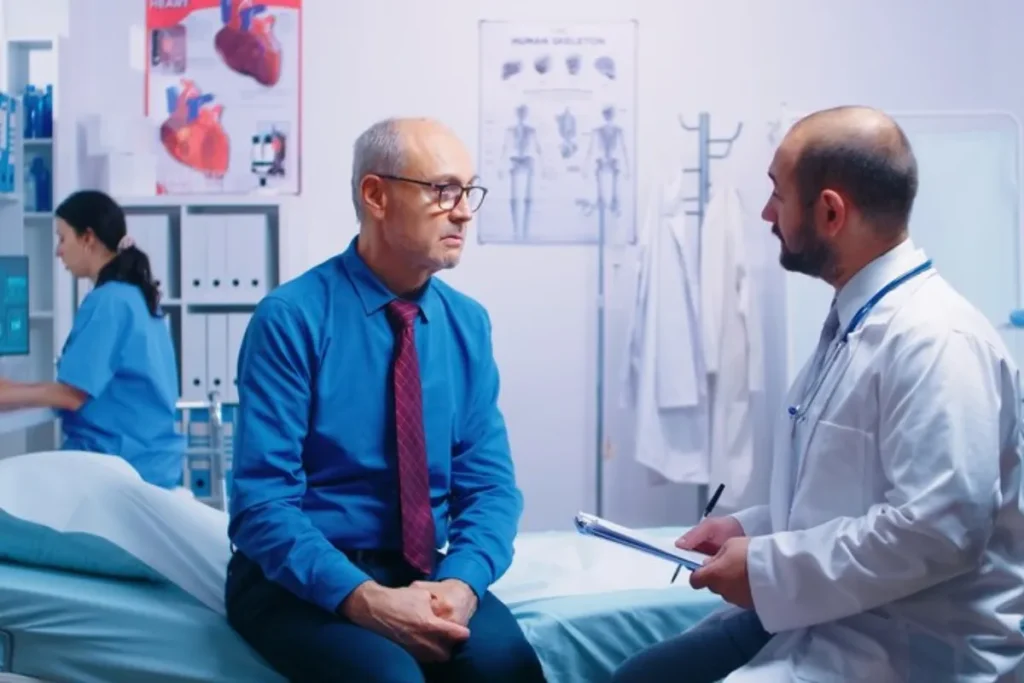Prostate cancer is a common health concern for men, particularly as they age. This article dives deep into everything you need to know about prostate cancer, from understanding its causes and symptoms to exploring potential preventive measures.
What is the Prostate?
The prostate is a small, walnut-shaped gland located in the lower abdomen, just below the bladder. It plays a crucial role in the male reproductive system by producing seminal fluid, a nutrient-rich liquid that nourishes and transports sperm.
What is Prostate Cancer?

Prostate cancer develops when normal cells in the prostate gland grow abnormally and uncontrollably. These abnormal cells can form tumors, which can be either cancerous (malignant) or noncancerous (benign). Early-stage prostate cancer often grows slowly and may not cause any symptoms. However, as the cancer progresses, it can spread to other parts of the body.
Causes of Prostate Cancer
The exact cause of prostate cancer remains unknown. However, several factors can increase a man’s risk of developing the disease:
- Age: The risk of prostate cancer increases significantly after age 50.
- Family History: Having a father, brother, or close male relative diagnosed with prostate cancer increases your risk.
- Genetics: Certain gene mutations can predispose men to prostate cancer.
- Diet: A diet high in saturated fat and red meat might be linked to an increased risk.
- Obesity: Being overweight or obese can elevate your risk.
Symptoms of Prostate Cancer
In its early stages, prostate cancer often presents no noticeable symptoms. However, as the cancer progresses, you might experience some of the following:
- Urinary problems: Frequent urination, especially at night, difficulty starting urination, weak urine flow, or feeling like the bladder isn’t emptying completely.
- Blood in the urine or semen: This is a less common symptom but should not be ignored.
- Pain: Pain or burning during urination (dysuria), pain in the lower back, hips, or pelvis, or painful ejaculation.
- Sexual problems: Erectile dysfunction (impotence) or decreased libido.
It’s important to remember that these symptoms can also be caused by other conditions, such as benign prostatic hyperplasia (BPH), a noncancerous enlargement of the prostate. If you experience any of these symptoms, it’s crucial to consult a doctor for proper diagnosis.
Diagnosing Prostate Cancer
Early detection of prostate cancer is essential for successful treatment. Here are some common diagnostic methods:
- Digital Rectal Exam (DRE): The doctor feels the prostate gland through the rectum to check for lumps or abnormalities.
- Prostate-Specific Antigen (PSA) Test: A blood test that measures the level of PSA, a protein produced by the prostate. While elevated PSA levels can indicate prostate cancer, they can also be caused by other factors.
- Prostate Biopsy: A small sample of prostate tissue is extracted with a needle and examined under a microscope for the presence of cancer cells.
Treatment Options for Prostate Cancer

The course of treatment for prostate cancer depends on various factors, including the stage and aggressiveness of the cancer, your overall health, and your preferences. Here’s an overview of some common treatment options:
DON'T MISS
- Active Surveillance: For slow-growing cancers, doctors might recommend monitoring the cancer closely without immediate treatment.
- Surgery: Radical prostatectomy involves surgically removing the entire prostate gland.
- Radiation Therapy: High-energy rays are used to kill cancer cells. Radiation therapy can be administered either externally or internally (brachytherapy).
- Hormone Therapy: This approach reduces testosterone levels, which can slow or stop the growth of prostate cancer cells that rely on testosterone to thrive.
- Cryotherapy: Extreme cold temperatures are used to freeze and destroy cancer cells.
Prostate Cancer Prevention
While there’s no guaranteed way to prevent prostate cancer, here are some lifestyle changes that might help reduce your risk:
- Maintain a Healthy Diet: Focus on a diet rich in fruits, vegetables, and whole grains. Limit saturated fat, red meat, and processed foods.
- Exercise Regularly: Aim for at least 30 minutes of moderate-intensity exercise most days of the week.
- Maintain a Healthy Weight: Being overweight or obese can increase your risk.
- Discuss Screening Options with Your Doctor: Talk to your doctor about the pros and cons of prostate cancer screening tests, such as the PSA test. Early detection is crucial for successful treatment.
Disclaimer: This material, including advice, provides general information only. It is in no way a substitute for a qualified medical opinion. Take the methods, and claims mentioned in this article as suggestions only; DNP India does not confirm or refute them. Consult a doctor before implementing any such suggestions/ treatment/medicine/diet.



